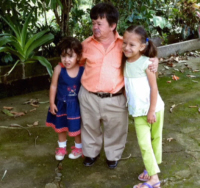Professor Valter Longo
Ecuadorian Villagers - Laron Syndrome
Horizon - Eat, Fast and Live Longer

Chilli Cheese Fries
Even though the evidence supporting the benefits of calorie restriction is getting stronger all the time, I cannot in all honesty imagine myself
doing what Joe does. Which creates something of a dilemma. So, what I really want to do is try to understand the ways in which calorie restriction works,
then hopefully I can get all the delicious benefits without actually having to do it.
I'm in Los Angeles a city that is notoriously addicted to youth. In fact, many people here seem to think that growing old and wrinkled is optional.
I'm not going to see anyone as superficial as a plastic surgeon. I'm here to meet one of the worlds foremost experts on ageing.

Disparate Mice
Prof Valter Longo studies the complex mechanisms which control ageing. He's honed in on a critical pathway that links what we eat with how we
age. He's taking me to see two mice. They are both the same age, same species, same sex. But there is one significant difference between them. The
little one is going to be living an awful lot longer than the big one.
Professor Longo "This little mouse right here holds the world record for longevity extension in a mammal."
So, how long would these subspecies of mice last?
Professor Longo "The big mouse here, about two years, and the little mouse about a 40% longer lifespan."
Right, they are very different aren't they?
Professor Longo "The big mouse already has a 50% chance of being dead. He's lucky to be alive, that's right. Small one probably has another year to go."
The little guy will live onto the equivalent of what, 120 in human?
Professor Longo "Exactly, yeah. Another 30 to 40 years in human years."

Professor Valter Longo

Laron Syndrome Dwarves
The little mouse I'm holding is actually a man-made creation. The reason he's so small and so long-lived because he's been genetically engineered.
He has incredibly low levels of a growth hormone called Insulin-like Growth Factor 1. And it seems IGF-1 is a key factor linking calorie restriction
and longevity.
Clues to the link come from this group of people who live in a remote region of Ecuador. They have a very rare condition called Laron syndrome,
which affects less than 350 people worldwide.
That's you, is it? It makes you look like a giant, doesn't it?
Professor Longo "I'm the tall guy there. The shortest one is just over three and a half feet tall."
What interests researchers like Valter is not their size, but the fact that they seem to be virtually immune to two of the West's biggest killers.
Professor Longo "The big findings, of course, are, they don't seem to get either diabetes or cancer."

Washington University
Do they do all the normal, sensible things we all do, like drink, smoke and all that?
Prof Longo "Yes, they do the normal, and more, so they have a very unhealthy lifestyle. Most of them are to some extent at least overweight.
They seem to really not watch anything they do. They smoke or eat very high calorie diets, and then they look at me and they say, 'Oh it doesn't
matter, I'm immune.' But the incredible thing is that there is no evidence of a single one of them ever dying of cancer, yet their normal-size
relatives get cancer like everybody else."
People with Laron syndrome have a mutation which makes them small, but which also seems to protect them against all these diseases.
Professor Longo "It's incredible working with them. It's a great group, and of course, for us, is a group that in one mutation, can tell us
so much about diabetes, cancer, cardiovascular diseases and ageing."
The Ecuadorian villagers and the long-live mice have something in common. Their bodies produce exceptionally low levels of the growth
hormone IGF-1. This discovery helped Valter piece together the role that IGF-1 plays in the complicated business of ageing.
Our bodies are normally in go-go mode – cells constantly driven to divide by IGF-1. But when IGF-1 levels drop, our cells shift into
completely different mode. The body slows production of new cells and starts repairing existing ones instead. DNA damage is more likely to get fixed.
And that's why the mice AND the villagers are protected from age-related diseases.




